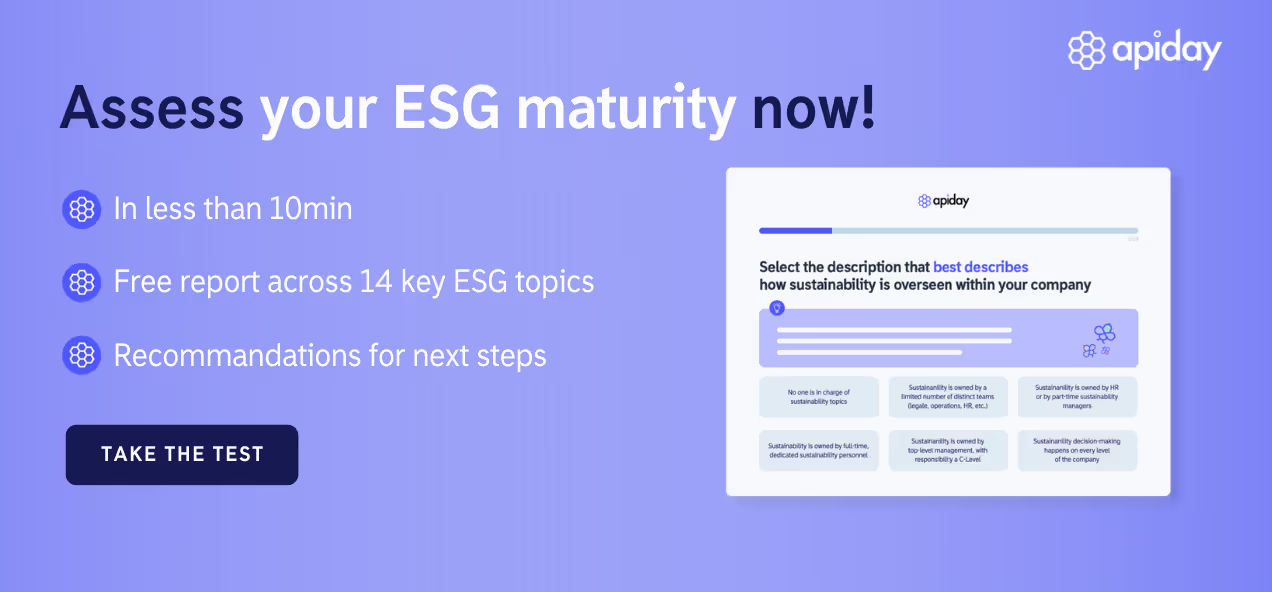What is a B Corporation: what this means and its benefits for companies

A B Corporation is a for-profit entity that is committed to creating a beneficial impact on society and the environment.
Companies can take this commitment by becoming certified through the nonprofit organisation B Lab, meeting rigorous standards of social and environmental performance, accountability, and transparency. Being a B Corporation has many benefits for companies as it is well-regarded by investors, customers and employees.
What is B Corp
B Corp certification: an ESG certification
B Corp sustainability certification looks at various environmental, social and corporate governance (ESG) criteria to assess a company’s performance beyond financial results.
It includes for instance an evaluation of the company’s policy for reducing carbon emissions caused by transportation, the percentage of managerial staff that comes from underrepresented populations, and the anti-corruption reporting and prevention systems it has in place.
B Corp certification: A force for good
Certified B Corps commit to using their profits for a positive impact on the world.
As stated in the B Corp declaration of interdependence, they must conduct their business as if people and places matter, and should aspire to do no harm and benefit all through their products, practices, and profits.
Therefore, B Corp certification doesn’t simply assess a product or a service sold by a company but rather its broader impact on society and the environment.
B Corp certification: a B Lab certification
B Corp certification is managed by a non-profit organisation called B Lab, which was created in 2006 by three former Stanford University roommates: Andrew Kassoy, Bart Houlahan, and Jay Coen Gilbert.
After several years spent running a sporting goods company, Houlahan and Coen Gilbert realised through discussions with Kassoy, who had been working in private equity, that there was no way to understand whether a company was having a positive impact on society or not.
Together they decided to change the system so that capitalism could create value for all stakeholders, not just for shareholders.
Becoming a B Corp: The methodology
- Governance: the company’s mission, stakeholder engagement, ethics, and transparency.
- Workers: employees’ financial security, health, wellness and safety in the workplace, career development, engagement, and job satisfaction.
- Community: the organisation’s diversity, equity and inclusion, economic impact, civic engagement and contribution to society, and supply-chain management.
- Environment: the company’s environmental management and how its business practices impact surrounding air, climate, water, land, and life forms.
- Customers: customer stewardship through sales and marketing and ensuring the best customer experience.

As part of their application for B Corp certification, companies must complete a B Impact Assessment (BIA), available for free online, which involves answering roughly 200 questions about the topics addressed by these categories.
The standards used in the BIA are overseen by B Lab’s independent Standards Advisory Council and updated every year.
Who is B Corp certification for?
B Corp-certified companies: Eligibility criteria
Only for-profit companies that have been operating for at least 12 months prior to the date of application are eligible for B Corp certification.
Companies and startups less than one year old are eligible for Pending B Corp status, for which they need to comply with B Corp legal requirements and fill out an indicative B Impact Assessment, which will not be reviewed before the company’s first anniversary.
Companies that are publicly traded or have between $100 million and $4.9 billion in annual revenue, and large multinational and parent companies that have more than $5 billion in annual revenue, are also eligible for B Corp certification, but will have to follow a slightly different process as there will be additional considerations and requirements.
Parent companies with subsidiaries, subsidiaries themselves, affiliated entities and franchises are subject to the same requirements.
An important element to consider before starting the B Corp application process is to make sure you have the support of all your company’s teams, including management and the board.
Building a strong lead team that encompasses people from a selection of departments along with a dedicated project manager and a timeline is also essential.
And discussions with the leadership team and the board must take place before starting the process in order to ensure everyone understands and agrees with the level of transparency and the changes to the articles of incorporation that will be required.
What are the benefits of B Corp?
Improved resilience
According to a study published by Deloitte in 2021, 87% of surveyed C‐level executives and senior public‐sector leaders who declared they have done very well at balancing the needs of all their stakeholders also felt that their companies could quickly adapt and pivot in response to disruptive events.
More specifically, according to this research, organisations with good reputations for valuing their workforces, helping communities, and being transparent with stakeholders on ESG issues are more likely to score highly on key resilience indicators.
Attracting and retaining talent
Being a B Corp-certified company helps to recruit and retain employees.
A 2016 study carried out by LinkedIn and Imperative found that purpose-driven companies get more engagement on LinkedIn, with a 33% higher InMail acceptance rate and 3.5 times more followers per employee.
In addition, it revealed that 74% of LinkedIn members place a high value on finding work that delivers on a sense of purpose, and that those purpose-oriented workers are more likely to stay at a company for more than 3 years than non-purpose-oriented workers.
Alignment with customer values
A NielsenIQ study published in 2015 found that 66% of respondents were willing to pay more for products and services that come from organisations that are committed to having a positive social and environmental impact.
B Corp certification is a trustworthy label, with high standards that flag to consumers that the company is committed to considering the impact of its decisions on its workers, customers, suppliers, community, and the environment.
Easy networking
Obtaining the B Corp certification also means joining a community of companies that share the same values and can potentially become partners.
B Lab supports the community with B2B peer circles—groups composed of B Corps that have the same best practices and ideas on a range of topics. In addition, certified B Corps gain access to discounts via the B Hive platform.
Enhanced investor attraction
As detailed in a Morgan Stanley report from 2018, assets under the management of signatories of the Principles for Responsible Investment (PRI) have risen exponentially from 2006, reaching $68.4 trillion.
This United Nations-supported network has attracted rising numbers of investors thanks to its systematic and explicit inclusion of material ESG factors in investment analysis and decisions.
Indeed, investors are now more aware than ever that managing environmental and social factors is simply part of sustaining competitive advantage in today’s economy and can mitigate risk events, and are increasingly wanting to align their personal values with their investments.
Frequently Asked Question
A B Corp company is a for-profit company that has been certified by the B Lab because it meets rigorous standards of social and environmental performance. Such organisations are committed to creating a beneficial impact on society and the environment.
B Corp certification is designed to help companies demonstrate that they care about the well-being of their customers, employees, and community. Certified B Corps are more likely to receive equity investment, retain top talents and customers are more prone to support their business.
Patagonia, Ben & Jerry's and Warby Parker are all B Corp companies.
Related articles

What is CSR (Corporate social responsibility) and how to adopt it?
CSR is an abbreviation for Corporate Social Responsibility. CSR strategies have become common in today’s corporate world as more and more companies realise that their business performance and its societal impacts are intricately connected.




















